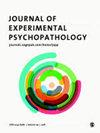精神分裂型、自闭症特征和阴谋论信仰的潜在特征分析:与认知灵活性和科学推理表现的关系
IF 1.9
4区 医学
Q4 PSYCHIATRY
引用次数: 0
摘要
分裂型和自闭症特征都与阴谋论(CT)信仰的发展有关。然而,这些特征之间既有相似之处,也有不同之处,这可能会增加个体对CT信念的易感性。过去的研究通常采取以变量为中心的方法,假设不同变量之间的关系(即分裂型,自闭症特征)是同质的。考虑到这些情况,我们使用了潜在轮廓分析(LPA)来评估分裂型、自闭症特征和相关社会认知倾向的个体内变异与CT信念、认知灵活性和科学推理表现的关联程度。在565名成年人的样本中,确定了五个不同的类别。临床评分最低(第1类)者科学推理能力最强,CT信念水平最低;临床评分最高(第4类和第5类)者科学推理能力最强,CT信念水平最高。进一步的分析揭示了混合组(例如第4类)的一些证据,其中较高的分析推理分数与较高的CT信念同时出现,但较低的科学推理分数。研究结果并没有提供证据证明高孤独症特征独立地预测了CT信念,但结果支持了这样一种观点,即科学推理似乎比分析推理的差异更能区分不同群体之间CT信念的差异。本文章由计算机程序翻译,如有差异,请以英文原文为准。
Latent profile analysis of schizotypy, autistic traits and conspiracy theory beliefs: Associations with cognitive flexibility and scientific reasoning performance
Schizotypal and autistic traits have both been implicated in the development of conspiracy theory (CT) beliefs. However, there are both similarities and differences between these traits that may increase an individual’s susceptibility to CT beliefs. Past research has often taken a variable-centred approach which assumes that the relationships among distinct variables (i.e. schizotypy, autistic traits) are homogenous. Given these circumstances, Latent Profile Analysis (LPA) was used to assess the extent to which within-individual variation in schizotypal, autistic traits and associated socio-cognitive tendencies are associated with CT beliefs, cognitive flexibility, and scientific reasoning performance. In a sample of 565 adults, five distinct classes were identified. Those with the lowest clinical scores (Class 1) had the highest scientific reasoning and lowest level of CT beliefs, whilst those with the highest clinical scores (Class 4 and 5), had the lowest scientific reasoning and highest CT belief scores. Further analysis revealed some evidence for mixed groups (e.g. Class 4) in which higher analytical reasoning scores co-occurred with higher CT beliefs, but lower scientific reasoning scores. The results did not provide evidence that higher autistic traits independently predicted CT beliefs, but the results support the view that scientific reasoning appears to better differentiate variation in CT beliefs across groups than differences in analytical reasoning.
求助全文
通过发布文献求助,成功后即可免费获取论文全文。
去求助
来源期刊

Journal of Experimental Psychopathology
Medicine-Psychiatry and Mental Health
CiteScore
2.00
自引率
0.00%
发文量
19
审稿时长
11 weeks
期刊介绍:
The Journal of Experimental Psychopathology (EPP) is an open access, peer reviewed, journal focused on publishing cutting-edge original contributions to scientific knowledge in the general area of psychopathology. Although there will be an emphasis on publishing research which has adopted an experimental approach to describing and understanding psychopathology, the journal will also welcome submissions that make significant contributions to knowledge using other empirical methods such as correlational designs, meta-analyses, epidemiological and prospective approaches, and single-case experiments.
 求助内容:
求助内容: 应助结果提醒方式:
应助结果提醒方式:


